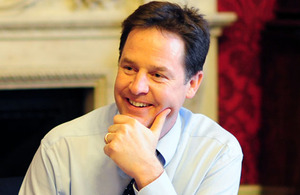Deputy Prime Minister on first official visit to Egypt
Deputy Prime Minister Nick Clegg visits Cairo today to meet Prime Minister Sharaf, business leaders and young political activists.

On his first official visit to Egypt, Mr Clegg will:
- reiterate the UK’s strong commitment to a long-term partnership with Egypt
- emphasise the need for a clear roadmap to democracy
- announce a package of support to assist the democratic process and economic reform
The support package includes:
- £5 million of UK funding for the European Bank for Reconstruction and Development to provide technical assistance and extend credit for small and medium sized enterprises in Arab Spring countries
- more than £0.5 million to support balanced election media coverage, women candidates and an international presence during the elections
- support to the Egyptian Higher Education sector to promote opportunities for political debate
- support for apprenticeships and small business development training for 10,000 young Egyptians and Tunisians
At a town hall event in central Cairo with young political activists the Deputy Prime Minister will say:
I met a number of you in London over the summer, where I was struck by your passion and your ideals, but also by your grit and professionalism. I am delighted to be with you in Cairo today - the frontline of the Arab Spring.
Egypt’s revolution - your revolution - was a triumph for peaceful protest. Not only have you changed the course of history for this great nation, but your successes have given heart to young men and women fighting for freedom and justice across North Africa and the Middle East, and across the world. You have landed a major victory for democracy and human rights. You have given dictators everywhere reason to fear.
I know many of you are worried that the momentum for change in Egypt is being lost. So I want to make it crystal clear that the UK will stand shoulder-to-shoulder with you as we work together to help Egypt complete this journey. The hopes and dreams that drove the revolution must be turned into a fair and plural politics, as well as a thriving economy that delivers opportunities for all.
I will be meeting Prime Minister Sharaf later today, and I will make clear that the international community stands ready to provide the financial assistance needed to boost your economy and create jobs, and the UK will play its part. With UK businesses providing more investment to Egypt than any other nation - a staggering 70 per cent - I make no apology for pointing out that our prosperity is linked to Egypt’s success too.
But, like you, we want to see a clear and credible timetable for transition, along with a lifting of the harsh and outdated Emergency Law. Security must be restored to the streets. And Egyptians deserve clear guarantees on human rights including women’s rights. Citizens of all backgrounds and faiths must be assured of their place in Egypt’s future, and all minorities must be given proper protections under the law.
Anyone who wants more democracy and less extremism in the world must see that Egypt is the best place to start. Where you lead, others will follow, and the UK is with you every step of the way.
The Deputy Prime Minister gave his first speech about the Arab Spring in Brussels on 2 March. He made further comments on August 22 at the British Council.
Notes to editors
- The Deputy Prime Minister met Egyptian and Tunisian political activists at the British Council in London on 22 August 2011 and will be meeting the same Egyptian activists again in Cairo today.
- In 2010 British companies accounted for more than $4 billion of foreign direct investment in Egypt - over 70 per cent of Egypt’s total. Nearly 900 British companies are active in the Egyptian market.
- The Deputy Prime Minister will be meeting business leaders in Cairo from BP, Shell, Vodafone, HSBC and Standard Chartered.
- The British Council - the UK’s cultural relations body - is working with partners, including the Ministry of Education and Higher Education in Egypt, on a series of projects providing young Egyptians with the opportunities, tools and training to improve their long term prospects. These include: The “Widening Opportunities for Youth Employability” Initiative that will provide apprenticeships and small business development training to 10,000 young Egyptians and Tunisians and will reach a further 60,000 via social media, and some 12 million youths through a skills TV programme over the course of two years. Young Arab Voices Project is a partnership between the British Council and the Anna Lindh Foundation designed to encourage young people in the region to enhance their skills in dialogue and debate allowing them to engage better with their peers in the Arab and wider world.